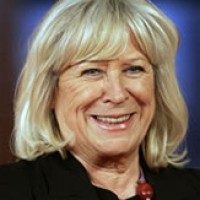Margarethe von Trotta
21.02.1942, Berlin, Germany
In the beginning of her career she acted in films (among others in Fassbinder’s); successfully worked with her husband, Volker Schlöndorff, with whom she is a co-director of Katherina Blum’s Lost Honor. Von Trotta’s films often have political or feminist themes and are usually better accepted by critics then general audiences. She is especially interested in questions regarding contemporary life in Germany.

Von Trotta is a German actress, director and screenwriter and one of the leading names of the new German film as well as one of the most famous directors who deals with feminist issues.
She moved to Paris from her hometown Berlin and worked for different film collectives co-writing screenplays and co-directing short feature films. After returning to West Germany in the early 1960’s she studied art, German and Romanian languages and took acting classes. She began her acting career in some smaller films and acted in several TV series. She worked mostly with these two directors: Rainer Werner Fassbinder and Volker Schlöndorff. She starred in Fassbinder's dramas Götter der Pest (1970), Der amerikanische Soldat (1970) and Warnung vor einer heiligen Nutte (1971). She worked with Schlöndorff on his TV adaptation of Bertolt Brecht’s play Baal (1970), TV drama Der plötzliche Reichtum der armen Leute von Kombach (1971) and feature films Die Moral der Ruth Halbfass (1972), Strohfeuer (1972) and Der Fangschuß (1976). She married Schlöndorff in 1971. They wrote screenplays for his films together, and even directed the film The Lost Honor of Katharina Blum (Die verlorene Ehre der Katharina Blum, 1975). Trotta directed the drama The Second Awakening of Christa Klages (Das zweite Erwachen der Christa Klages, 1978). After the film Sisters or The Balance of Happiness (Schwestern oder Die Balance des Glücks, 1979), she proved herself as a director with the drama Marianne & Juliane (Die bleierne Zeit, 1981), which was inspired by the life and suicide of the member of the Baader-Meinhof terrorist group Gudrun Ensslin, and her sister Christiane’s investigation of her death. It is a great example of a political feminist film that she became known for. The film won the Golden Lion and the FIPRESCI award at the Venice Film Festival, award for best film at the German Film Awards in 1982 and the David di Donatello award for best director in that same year. Her next film Heller Wahn (1983) did not achieve much attention, but once again she made a great success with her biopic Rosa Luxemburg (1986). In late 1980’s she directed unnoticed Love and Fear (Paura e amore, 1988). She directed the drama L'africana (1990) with one of her frequent actresses Barbara Sukowa and with the Italia acting crew she filmed Il lungo silenzio (1993). One of her most important films from the 1990’s is The Promise (Das Versprechen, 1995) after which she directed three TV films. She also directed the mini TV series Jahrestage (2000). Her next film for the big screen was Rosenstrasse (2003), drama about the peaceful protest in Berlin in 1943, which attracted the audience’s and critics’ attention once again. She received the SIGNIS and Unicef award at the Venice Film Festival in 2003. She also won the Italian Golden Globe for best film in 2004 and the David di Donatello award for best European film (together with Von Trier’s Dogville) in that same year. Drama I Am The Other Woman (Ich bin die Andere, 2006) did not achieve much success unlike the biopic Vision (Vision - Aus dem Leben der Hildegard von Bingen, 2009) once again starring Sukowa. Her biggest success in the later period was the biopic Hannah Arendt (2012), starring Sukowa as the Jewish-German philosopher. Currently her last film is The Misplaced World (Die abhandene Welt, 2015), and The Odd Couple is in pre-production. Besides working on films she also teaches at the European Graduate School in Saas-Fee in Switzerland.
Filmography
The Odd Couple (2017) (in pre-production)
Die abhandene Welt (2015)
Mai per amore (2012) (TV series, 1 episode)
Die Schwester (2010) (TV)
Vision - Aus dem Leben der Hildegard von Bingen (2009)
Tatort (2007) (TV series, 1 episode)
I Am The Other Woman (Ich bin die Andere, 2006)
The Other Woman (Die andere Frau, 2004) (TV)
Rosenstrasse (2003)
Jahrestage (2000) (TV series, 4 episodes)
Dunkle Tage (1999) (TV)
Mit fünfzig küssen Männer anders (1999) (TV)
Winterkind (1997) (TV)
Promise (Das Versprechen, 1995)
Il lungo silenzio (1993)
L'africana (1990)
Love And Fear (Paura e amore , 1988)
Felix (1988) (omnibus, segment "Eva")
Rosa Luxemburg (1986)
Heller Wahn (1983)
Marianne & Juliane (Die bleierne Zeit, 1981)
Sisters or The Balance of Happiness (Schwestern oder Die Balance des Glücks, 1979)
The Second Awakening of Christa Klages (Das zweite Erwachen der Christa Klages, 1978)
The Lost Honor of Katharina Blum (Die verlorene Ehre der Katharina Blum, 1975) (co-director)